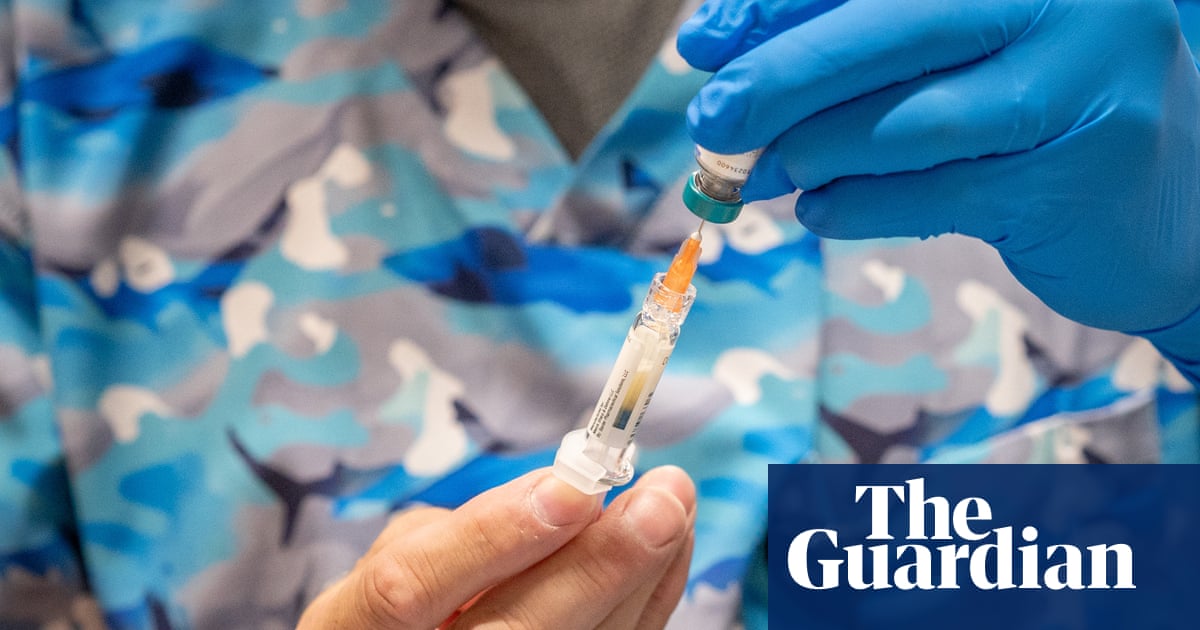A key vaccine advisory panel reconstituted by health secretary and vaccine skeptic Robert F Kennedy Jr is slated to discuss thimerosal-containing influenza vaccines in itsfirst meeting– an ingredient which has been a fixation of anti-vaccine activists for decades.
The Centers for Disease Control and Prevention’s Advisory Committee on Immunization Practices (ACIP) will hold two separate votes later this month: one on “influenza vaccines” and one on influenza vaccines that contain thimerosal.
Thimerosalis an ethylmercury preservative used in multi-dose vaccine vials to prevent fungi and bacteria growth. The preservative has been studied and deemedsafe, but was nevertheless removed from all routine childhood vaccines in 2001 as a precaution.
“I was there when we went through this the first time,” said Dr Paul Offit, director of the vaccine education center and an attending physician in the division of infectious diseases at Children’s Hospital of Philadelphia, about debates over the preservative in the early 2000s.
Offit served on the ACIP panel in question from 1998 to 2003. He said the issue of thimerosal was vigorously debated and found safe then, prompting him to ask: “What’s the point?”
In a short history of the thimerosal controversy published in theNew England Journal of Medicine, Offit described how some parents became convinced thimerosal gave their children autism, resulting in thousands of autistic children receiving heavy metal chelation treatments each year.
Studies have found no link between thimerosal and autism, according to the American Academy of Pediatrics. The National Vaccine Injury Compensation Programhas also deniedclaims of a thimerosal-autism link. Kennedy, however, haswritten a bookarguing against the use of thimerosal.
Offit said the discussion of thimerosal appeared to geared to, “accomplish [Kennedy’s] goals of making vaccines less affordable, less accessible and more feared”, he said.
“Here’s what you do know – you do know RFK Jr is an anti-vaccine, science-denying conspiracy theorist. He is devoted to this, he is a zealot, there is no middle ground with him,” said Offit. “He believes we have merely substituted infectious diseases for chronic diseases.”
The panel’s advisory recommendations are critical because they result in vaccine “schedules”. These schedules are relied on by health insurers to determine which vaccines to cover and by clinicians who use them as an evidence-based guide on immunization – effectively giving the American public access to the medicines.
Although the CDC does not always take the panel’s advice, the CDC typically affirms the panel’s decisions. However, the agency is currentlywithout a leader, as Senate hearings have not yet been held for nominee and CDC career official Susan Monarez. As a result, Kennedy has signed off on some previous ACIP recommendations.
Kennedy wrotea bookon the preservative thimerosal in 2014 called Thimerosal: Let the Science Speak, in which he argues that “there is a broad consensus among research scientists that thimerosal is a dangerous neurotoxin that should be immediately removed from medicines”. Kennedy said in the book he is “pro-vaccine”.
Until 9 June, the ACIP was an independent panel of 17 experts who served staggered terms and were rigorously vetted by career CDC staff. Kennedy broke with tradition whenhe firedthe entire panel, claiming in a Wall Street Journaleditorialthat he was working to “restore public trust in vaccines”.
The same week, Kennedy appointedeight new membersto the committee, including medical professionals withlittle vaccine expertiseand known vaccine skeptics.
Awide spectrumof groups criticized the decision, from MomsRising, who said they were “alarmed and disgusted”, to major doctors’ groups such as theAmerican Academy of Pediatrics, to public health leaders who described Kennedy’s actions as “a coup,” to the former members of the committee, who warned the independent panel was at “a crossroads”.
The group is scheduled to meet the last week of June. Prior to Kennedy’s changes, they had been expected to discuss reducing the number of shots needed for human papilloma virus (HPV) and a meningococcal vaccine.
On Wednesday, the panel released adraft agendafor its upcoming meeting. A wide range of vaccines will be discussed – including those against influenza; the tropical disease chikungunya; the measles, mumps, rubella and varicella (chickenpox) vaccine; anthrax; Covid and respiratory syncytial virus (RSV).
The agenda scheduled a vote on recommendations for flu vaccines, including the multidose versions that still contain thimerosal. These vaccines are used only in adolescents and adults. The panel is also scheduled to vote on recommendations for maternal and pediatric versions of the respiratory syncytial virus (RSV).
Notably, despite Kennedy’s repeated pledges of “radical transparency”, the draft agenda does not include the names of many speakers, which are listed as “TBD” (to be determined) for instance on “Covid-19 safety update”.
New ACIP members havenot been addedto a conflict of interest tracker for ACIP membersdeveloped bythe Trump administration. A spokesperson for HHS said the new members ethics agreements “will be made public” before they start work with the committee.
In addition to the new draft agenda, there have also been changes to the committee’s meeting times not reflected in the Federal Register, according toPolitico. The group will meet for two days instead of three, and there does not appear to be a vote scheduled on Covid vaccines.
